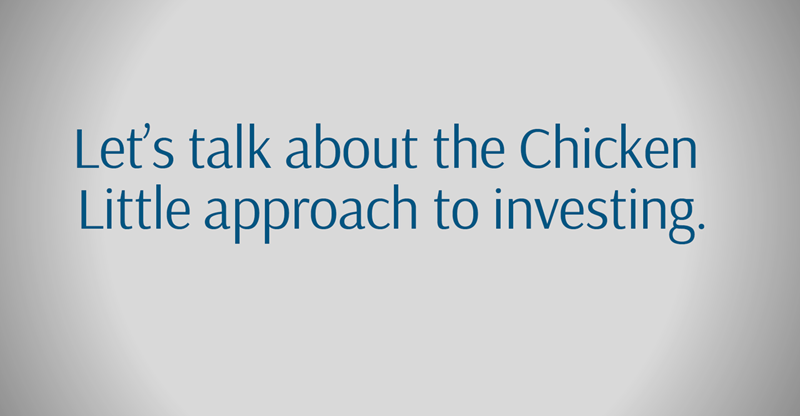Chicken Little and Today's Marketplace

Chicken Little and Today's Marketplace
Today’s market volatility reminds me of the folk tale of “Chicken Little” who, after having an acorn fall on his head was convinced that the “Sky” was falling. He had to let everyone know.
On his journey to inform his King of the impending danger, he meets other animals. They join Chicken Little on his trip to the King’s Palace. There are many endings to this story. The "Sky" wasn't really falling, nor was the world coming to an end despite his fear. In one familiar ending, a sly fox sees an opportunity to invite them into his lair for dinner and eats them all.
Let’s not get eaten by today’s market turbulence. No one can predict or control the “random walk of the market.” Prices for securities have always gone up and down, and continue to do so. In business school we were taught that the “market is efficient,” meaning that all that could be known about an investment security were known, and this knowledge was properly reflected in the final closing market price of that security at the end of each trading day. Simply stated, you can’t beat the market. It is what it is.
Today however, an argument could be compellingly made that markets may not be efficient. The “big elephant” in the room stomping around that causes the extra volatility in market closing prices is “government.” While the efficient market theory may capture knowledge about a specific investment, it can’t capture the unintended consequences caused by government actions like trade wars, Brexit, Federal Reserve actions or non-actions on interest rates, foreign government central banks having different policies today than our Federal Reserve, increasing civil unrest worldwide, and political maneuvering compromising the ability for government to function (i.e., government shutdowns). The bottom line is that today’s volatility is being caused by lots of things that are out of our control.
Fear, uncertainty, and doubt are normal byproducts of this type of period. But, for the individual investor, they are a terrible state of mind to make important financial decisions upon.
So, let’s avoid overreacting to things we can't control. Rather than being fearful, it is important to look at facts and make better decisions for long term investment success. Rather than “freaking out,” Chicken Little should have instead asked, “When is it going to hit? Is it all going to come down in one place? What options do I have? Could I be wrong?”
Common mistakes investors make are to panic in prolonged market drops and/or get out of the market entirely for fear of losing money. “The Sky is Falling.” They may fail to understand that the actual historical performance of the market shows that most gains occur during only a few trading days a year. A “Business Insider” article by Sam Ro on March 12, 2015 (https://bit.ly/1F407iR) used a J.P. Morgan study to illustrate this phenomenon. If you are out of the market on those days, you miss these gains, and the long-term performance of your portfolio drops dramatically. That JP Morgan study shows that an investor who stayed fully invested in the S & P 500 from 1995 through 2014 would have had a 9.85% annualized return. However, if they jumped out of the market and missed just the ten best days during that same period, those annualized returns would collapse to 6.1%. And, if the investor missed the 30 best days, their annualized return would have been a negative 1.49%.
At the end of the day, the moral of this story might be to maintain a well-diversified, risk adjusted portfolio, and have patience and understanding of the above. My suggestion is don’t panic or make avoidable mistakes like “getting out of the market” or selling “good” investments at very low prices during market drops. The reality is that other investors are only too happy to buy your investments at the same depressed prices. There are always two sides to each transaction.
The good news is there is also opportunity during this period of volatility. One potential opportunity is to be able to buy "good" investments while they are “on sale.” It’s like buying the new car you want when it goes on sale for a 10% discount. You get the same car, for less. Buying investments at their lower prices gives us an opportunity to position our clients to pursue better gains when/if the market turns around.
Does this mean these investments won’t drop further in price? Certainly not. They could. But that is the risk we take as investors. Currently, many people expect a “recession” sooner rather than later. It could, and likely will happen. Maintaining a well-diversified portfolio, balanced to your risk tolerance, coupled with regular rebalancing by your financial advisor is about the best anyone can do to protect themselves during down periods. Adding “dollar cost averaging” helps buy “good” investments in your portfolio on a regular basis thereby “smoothing” out their total cost and helping improve your chances of a better long term return.
Use money wisely. Consider buying "good" products/investments when they are “on sale.” Work with the highest quality financial advisor you can to ensure that your portfolio is properly constructed and regularly managed. Put market volatility in perspective. Hopefully, these comments will help calm “fear” and reemphasize the importance of staying focused on the long-term goals of your portfolio. As always, your best interests are our best interests. Please call us if you have any questions.
Frank Deptola | President Frank Deptola & Associates, LLC 333 City Boulevard West, Orange, CA 92868 Phone: (714) 348-8979 | Email: frank.deptola@deptola.com | Website: www.deptola.com CA Insurance License # 0F34992

